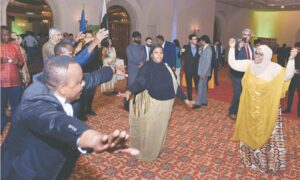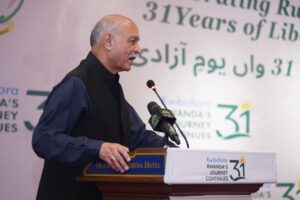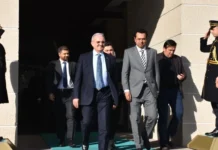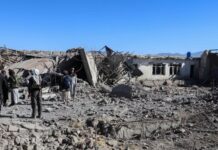 https://twitter.com/home https://www.facebook.com/Shabbir.Hussain191
https://twitter.com/home https://www.facebook.com/Shabbir.Hussain191By Shabbir Hussain
ISLAMABAD, July 5 (Alliance News): Rwanda’s High Commissioner to Pakistan, Ms. Fatou Harerimana, led the vibrant celebrations of Rwanda’s 31st Liberation Day in Islamabad, highlighting her country’s remarkable transformation from genocide to growth.
The event, hosted by the Embassy of Rwanda, marked a significant milestone in the nation’s journey of unity, resilience, and development.
The ceremony was attended by an esteemed audience, including Chief Guest Senator Mushahid Hussain Syed, Governor Sindh Kamran Khan Tessori, parliamentarians, ambassadors, the Dean of the African Group, senior diplomats, members of civil society, and the Rwandan diaspora in Pakistan.
Rwandan Envoy to Pakistan H.E Fatou Harerimana
In her keynote address, Ambassador Fatou Harerimana paid tribute to the Rwandan people and their leadership, particularly President Paul Kagame, under whose guidance Rwanda has emerged as one of Africa’s most progressive and stable countries.

“Liberation Day, observed every July 4, marks the rebirth of our nation following the 1994 genocide against the Tutsi. It reminds us of the heroic efforts of the Rwanda Patriotic Army (RPA), who halted the genocide and restored our dignity, unity, and right to life,” she said.
The Ambassador noted that while Rwanda achieved independence from colonial rule on July 1, 1962, it was not until the Liberation of 1994 that the country found peace and direction.
“Liberation was a turning point. It ended divisionism and began a new era of reconciliation, development, and national unity.”
Highlighting Rwanda’s post-liberation achievements, Ambassador Harerimana noted that under President Kagame’s visionary leadership, Rwanda’s GDP grew to 8.9% in 2024, making it one of the fastest-growing economies in Africa.

She added that Rwanda is renowned for its commitment to gender equality, environmental sustainability, and good governance. “We are proud to be Africa’s cleanest and greenest nation, and to lead globally with 63.7% female representation in our Parliament.”
Discussing bilateral relations, the Ambassador expressed Rwanda’s desire to deepen ties with Pakistan. “Our nations share friendly relations, marked by cooperation in defense, health, education, and trade.

We aim to further strengthen partnerships in agriculture, tourism, technology, artificial intelligence, and gender empowerment.”
She extended her gratitude to the Government and people of Pakistan for their hospitality and support since the opening of Rwanda’s diplomatic mission in June 2024.
“I thank Senator Mushahid Hussain Syed for honoring us with his presence and the people of Pakistan for their warm welcome.”
Senator Mushahid Hussain Syed
Addressing the gathering, Chief Guest Senator Mushahid Hussain Syed lauded Rwanda as an example of how visionary leadership and national unity can rebuild a nation devastated by conflict.

“Rwanda’s progress is a testament to the resilience of its people and the reformist leadership of President Paul Kagame. Today, Rwanda is a beacon of hope, peace, and prosperity in Africa.”
Senator Mushahid drew parallels between Rwanda and Pakistan, noting that both nations have confronted external threats and internal challenges.
“Our shared experiences give us common ground. The future of Rwanda and Pakistan is bright, built on cooperation, innovation, and shared aspirations.”
He emphasized the potential for greater collaboration, particularly in education, trade, and youth development. “There is much to learn from Rwanda’s digital transformation and inclusive growth models,” he remarked.
The ceremony began with an energetic performance by a traditional Rwandan cultural troupe, showcasing the country’s vibrant heritage through music and dance. Their performances brought color and rhythm to the evening, celebrating Rwanda’s cultural resilience.
Governor Sindh Kamran Khan Tessori also addressed the audience, praising Rwanda’s achievements and the leadership of President Kagame.
“Rwanda is a shining example of how determination and visionary governance can turn adversity into opportunity. We look forward to deepening engagement with Rwanda,” he said.
The event also underscored Rwanda’s long-term national development vision. Ambassador Harerimana elaborated on Vision 2050, Rwanda’s strategic framework to become an upper-middle-income country by 2035 and a high-income country by 2050.
“Our national principles—unity, accountability, and thinking big—continue to guide our journey toward inclusive and sustainable development,” she noted.

She also emphasized Rwanda’s leadership in international peacekeeping. “Our Defense Forces are among the top contributors to UN peacekeeping missions, reflecting Rwanda’s commitment to global peace and stability,” she said. “They are not just soldiers; they are ambassadors of peace.”
In closing, the Ambassador credited Rwanda’s achievements to the clarity and consistency of President Kagame’s leadership and the collective determination of the Rwandan people. “The journey of liberation is not complete.
It is a continuous path to safeguarding our values, unity, and national purpose,” she said.
The evening concluded with a ceremonial cake-cutting and a reception featuring traditional Rwandan cuisine. Guests enjoyed an immersive experience of Rwandan culture, hospitality, and warmth.
The 31st Liberation Day celebration in Islamabad was more than a ceremonial observance—it was a powerful statement of Rwanda’s evolving role in global affairs and its growing partnership with Pakistan.
It marked Rwanda not only as a nation that rose from tragedy but as one that thrives with dignity, vision, and purpose.
As Ambassador Harerimana aptly stated, “Liberation is not a destination; it is a journey. A journey that inspires hope, demands responsibility, and celebrates the spirit of a united people.”








